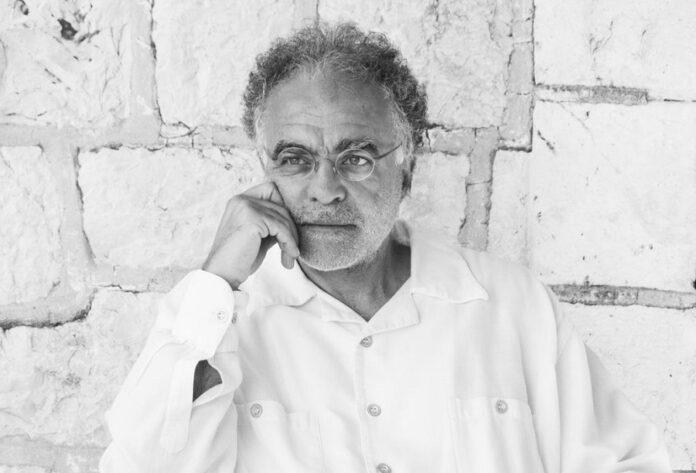DUBAI: Nadim Karam was among the many artists deeply affected by the August 4, 2020 Beirut Port explosion.
The 65-year-old artist and architect has taken inspiration from the Lebanese capital throughout his decades-long career and his colossal metal sculpture “The Gesture” — created a year after the tragedy — was his way of expressing his sorrow and trauma.
“I could not function and continue living without offering a gesture to the victims of the explosion and the sadness of Beirut,” Karam tells Arab News. “Hundreds of people died in the explosion, but I was still alive.”
The sculpture, made from metal salvaged from the blast, now stands in the heart of Beirut. “I created ‘The Gesture’ with a team of benevolent professionals and we all offered our own effort, time, and expertise to make sure that what happened will never be forgotten,” Karam explains.
“The Gesture” is typical of Karam’s work, which tends to both make statements and pose questions. Supplied
“The Gesture” is typical of Karam’s work, which tends to both make statements and pose questions, as evidenced by his contribution to “The Sublime Nature of Being,” a multi-sensory, immersive exhibition that recently opened in Dubai’s DIFC, featuring artists from across the world.
Curated by Ambika Hinduja Macker, who is an artist in her own right as well as the founder and creative director of design firm Impeccable Imagination, the exhibition explores the influence of nature on human experience. The showcase features everything from large-scale sculptures to light-and-shadow installations.
Karam began to sketch out his ideas for “Sublime Silence,” included in the exhibition, back in 2015. As its name suggests, it’s a piece based around the concepts of speaking and silence. And like ‘The Gesture” it has a deeper meaning than is suggested at first glance.
“I feel like genuine communication is being overwhelmed by the sheer quantity of noise,” Karam explains. “The downside of our instantaneous global communication networks is that there is too much shouting for attention on social media. Silence, allowing for thoughts and deep reflection, has become a rare and precious commodity. For me, silence is at the source and the essence of things.”
Karam began to sketch out his ideas for “Sublime Silence,” included in the exhibition, back in 2015. Supplied
Another of Karam’s pieces featured in the exhibition — “Memory Lapse” — also examines a dichotomy: That of emptiness and fullness. It consists of two sculptures facing each other. Karam describes it as an experiential work.
“They have reflective, polished, slightly concave surfaces,” he explains. “One is filled with patterns — stories and memories — and represents the past. The other is an empty reflective surface representing the future. By standing between them, you find the future and the past merged into the present through your vision.”
His third piece features a recurring motif of his work: The elephant.
Though emblematic of his artistic practice, “Crystal Elephant” is also something of a new approach for Karam. Supplied
“I am attached to the elephant, both their physical properties and the way they care about their community and have long memories,” he says. “In fact, I use the elephant to start any new idea in my work.
Though emblematic of his artistic practice, “Crystal Elephant” is also something of a new approach for Karam. It is the first time he has used crystals in his work. “They are reflective and alive, generating movement at a touch, and they emanate a beautiful energy in the space surrounding them,” he explains.
Karam also has a piece of his work — “On Parade” — on permanent display in AlUla. It was created as part of the first iteration of Desert X AlUla, the second edition of which is currently underway.

